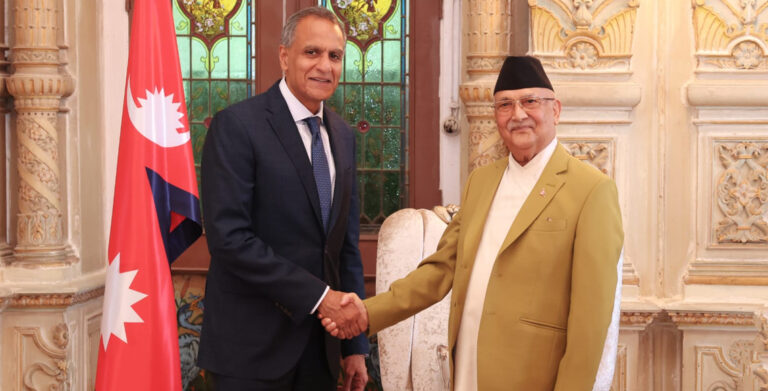U.S. Pushes Back Against China’s Secret Expansion in Nepal!

The U.S. Deputy Secretary of State for Management and Resources, Richard R. Verma, arrived in Nepal on a pivotal visit, signaling Washington's intent to deepen ties with the strategically located Himalayan nation. His visit comes at a time when Nepal is grappling with increasing Chinese influence and the complex dynamics of being sandwiched between two major powers—India and China. Verma’s discussions with Nepali leaders emphasized the need for Nepal to strengthen its relationships with democratic allies to protect its sovereignty, particularly against China's aggressive interventions.
Chinese Intervention in Nepal: Debt Trap Diplomacy and Assertive Tactics
China's intervention in Nepal has become increasingly assertive, characterized by a combination of debt trap diplomacy, aggressive territorial claims, and diplomatic pressure. Through the Belt and Road Initiative (BRI), China has heavily invested in Nepal’s infrastructure, but these projects often come with significant strings attached. The Pokhara International Airport, for instance, is a critical infrastructure project where China’s involvement has raised alarms. Despite Nepal’s reluctance to officially recognize it as part of the BRI, Chinese Ambassador Chen Song’s controversial statements attempting to link the airport to the BRI reveal Beijing’s intent to tighten its grip on Nepal through financial leverage.
Moreover, China's "wolf warrior diplomacy" has extended into Nepal's territorial integrity. The northern border regions, particularly Humla and Mustang, have witnessed what analysts describe as "salami slicing"—a strategy of gradual territorial encroachment. In these regions, Chinese infrastructure projects have crept into Nepali territory, exacerbating tensions. These actions not only undermine Nepal’s sovereignty but also serve as a stark reminder of Beijing's broader strategic ambitions in South Asia.
Indian Diplomacy: The Role of Vikram Misri
Amidst these challenges, India has played a crucial role in counterbalancing Chinese influence in Nepal. The recent appointment of Vikram Misri as India’s Foreign Secretary is significant in this context. Misri, an experienced diplomat who has served two terms in China, is regarded as an expert on Chinese strategy within Indian bureaucracy. His deep understanding of China’s tactics has been instrumental in shaping India’s approach towards its northern neighbor.
India has consistently warned Nepal of the dangers of becoming ensnared in China’s debt trap, offering itself as a more reliable partner that respects Nepal's sovereignty. Misri’s expertise has informed India’s strategic engagements with Nepal, emphasizing the importance of cultural, historical, and political ties that bind the two nations. India’s approach, under Misri’s guidance, aims to prevent Nepal from falling deeper into China’s sphere of influence, while promoting regional stability and cooperation.
U.S. Deputy Secretary of State Richard Verma’s Visit
Richard Verma’s visit to Nepal on August 16, 2024, as the U.S. Deputy Secretary of State for Management and Resources, was a clear demonstration of Washington’s intent to bolster its presence in South Asia. Verma, who previously served as the U.S. Ambassador to India, brought with him a wealth of experience and a deep understanding of the region’s geopolitical complexities.
During his visit, Verma met with key Nepali leaders, including Prime Minister KP Sharma Oli and Foreign Minister Dr. Arzu Rana Deuba. Discussions centered on economic cooperation, regional security, and the broader Indo-Pacific strategy. A significant portion of these talks focused on the Millennium Challenge Corporation (MCC) compact, a U.S.-funded grant aimed at improving Nepal’s infrastructure. Despite facing opposition from pro-Chinese factions within Nepal, the MCC remains a vital tool for ensuring that Nepal’s economic development does not fall under the shadow of Chinese influence.
Verma also met with Nepali business leaders and officials from USAID, emphasizing the U.S.’s commitment to transparent and sustainable development in Nepal. His visit underscored the broader U.S. strategy of ensuring that smaller nations like Nepal have viable alternatives to Chinese investments, which often come with long-term financial and strategic costs.
Nepal’s Sovereignty Under Threat
Nepal’s sovereignty has historically been under threat from Chinese expansionist policies. From territorial encroachments in the northern regions to debt traps that threaten Nepal’s economic independence, China’s tactics have consistently aimed at diminishing Nepal’s ability to operate freely on the global stage. The situation in Humla and Mustang, where Chinese infrastructure has crossed into Nepali territory, is a case in point. These incursions have been documented through satellite imagery and local reports, yet China continues to dismiss these as mere misunderstandings.
In addition to territorial threats, China's economic influence in Nepal poses a significant challenge. Projects like the Pokhara International Airport, which are heavily financed by Chinese loans, risk becoming strategic liabilities for Nepal if the nation is unable to repay its debts. This is a well-known pattern in China’s global strategy, where countries that fail to meet their financial obligations often find themselves forced to cede control over critical infrastructure to Beijing.
Conclusion: Balancing Relations to Protect Sovereignty
Richard Verma’s visit highlights the importance of Nepal strengthening its alliances with democratic powers like the U.S. and India. With China’s increasingly assertive actions, from debt diplomacy to territorial encroachments, Nepal must be vigilant in protecting its sovereignty.
Vikram Misri’s expertise in Chinese affairs and India’s proactive support provide a vital counterbalance to China’s growing influence. Meanwhile, Verma’s visit underscores Washington’s commitment to preserving Nepal’s independence through transparent and sustainable partnerships. As China continues to employ strategies such as debt traps and territorial expansion, Nepal’s long-term sovereignty will depend on its ability to cultivate balanced relationships with democratic superpowers. Maintaining strong ties with the U.S. and India is not only crucial for economic and security reasons but also essential for safeguarding Nepal’s independence in an increasingly multipolar world.
USA Embassy India In Nepal China In Nepal



![From Kathmandu to the World: How Excel Students Are Winning Big [Admission Open]](https://nepalaaja.com/img/70194/medium/excel-college-info-eng-nep-2342.jpg)
